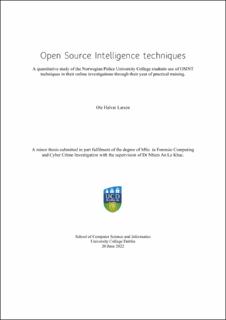Open Source Intelligence techniques: A quantitative study of the Norwegian Police University College students use of OSINT techniques in their online investigations through their year of practical training
Master thesis
Accepted version
Permanent lenke
https://hdl.handle.net/11250/3024865Utgivelsesdato
2022Metadata
Vis full innførselSammendrag
Eric Schmidt, chief executive of Google, estimated in 2021, the size of the internet to be 5 billion megabytes of data (Easytechjunkie.com, 2021). In parallel to this, the website Statista.com1 writes that the number of active users on Facebook increased from 800 million in 2011, to an astonishing 2.9 billion users in 2022.
With so many people living their lives on the internet, the knowledge of this digital arena and the techniques for searching and securing data is becoming an increasingly important area of expertise in the fight against crime. This can strengthen police investigations of criminal cases or provide knowledge in relation to operational assignments and preventive policing.
In their three-year education, police students at the Norwegian Police University College have one year of practical training. They serve in one of the 12 Norwegian police districts during this period. This year will primarily be a period of acquisition of new knowledge but also a period in which the police students are intended for the role of change agents. Change agents in relation to new knowledge from PHS present for the police districts they serve. In this master's thesis, I research the police students' use of OSINT techniques, and then try to find answers to how these techniques were used and whether this contributed to increasing the clearance rate in the cases they investigated.
This minor thesis will also research whether the police students' knowledge of methods and techniques is satisfactorily remembered for adoption in the police districts. Satisfactory in that it does not conflict with recognized information collection principles and follows the approved methods and current legislation. For the police students to use OSINT techniques correctly, the police districts are expected to facilitate this with the right and available equipment. In 2021, the Auditor General's report "Police efforts against crime using ICT" (National Audit Office, p. 5) described a lack of expertise and capacity.
In this context, this thesis will also be intended to shed light on how the students experienced the framework conditions for open sources in their year of practical training and whether there is room for improvement. Based on my research results, I will also discuss whether the knowledge we give students during the first year of study is good enough or whether there is a need for changes in learning objectives and lessons. (Se også norsk sammendrag i oppgaven).
Beskrivelse
A minor thesis submitted in part fulfilment of the degree of MSc. in Forensic Computing and Cyber Crime Investigation with the supervision of Dr Nhien An Le Khac
